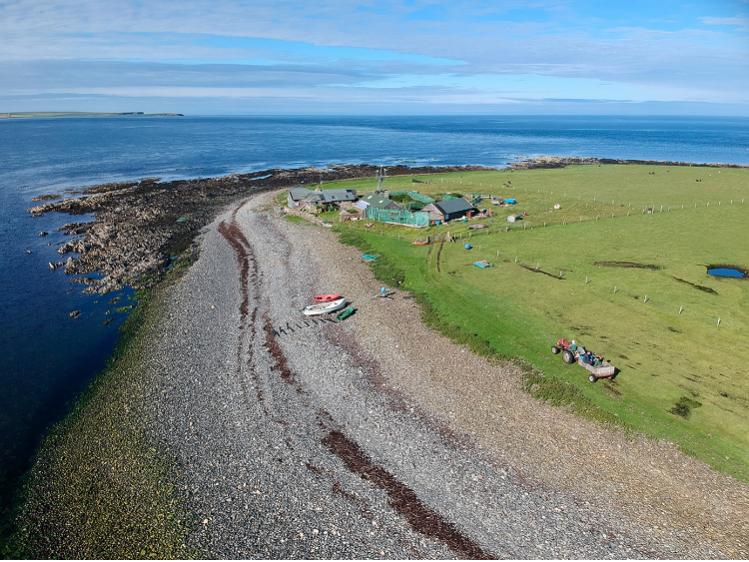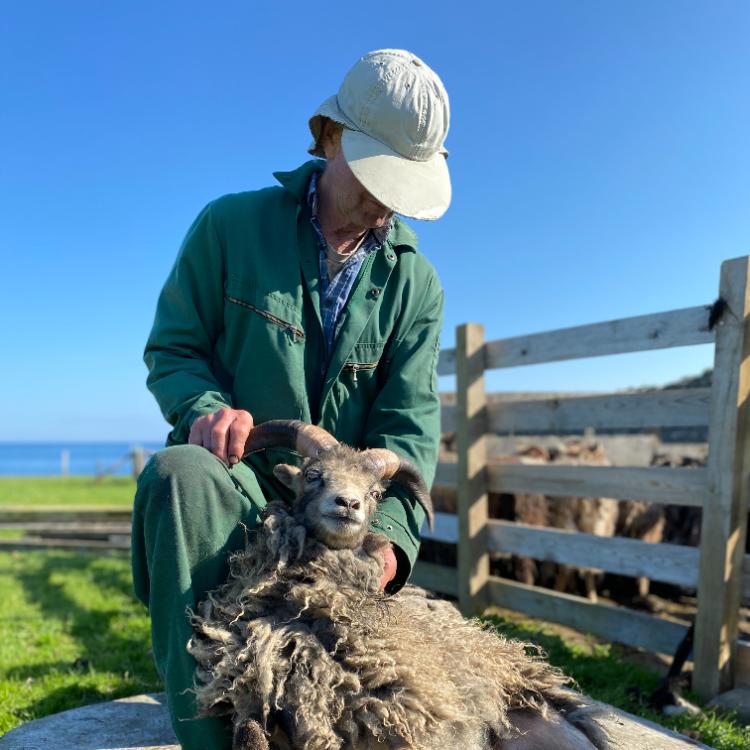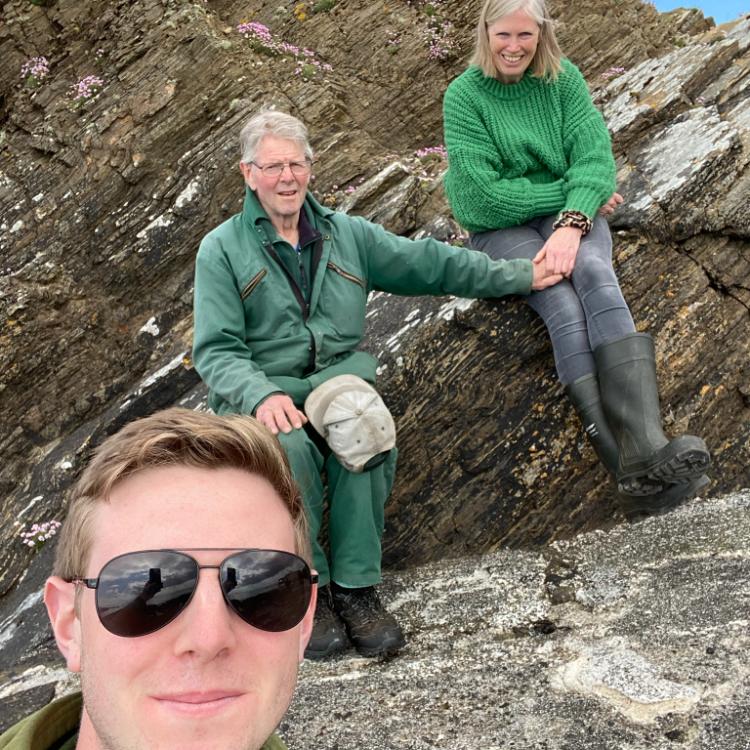Islands of isolation: The challenges of island living for dementia patients
The rural and comparatively isolated nature of island living complicates the process of receiving dementia care
7 min read
Island living presents unique challenges for people living with dementia and their carers, as Hamish Auskerry and his family have discovered.
My dad, Simon, has never been one for conformity. In the early 70s, he surprised everyone by moving to a remote Scottish island in Orkney. He had just quit his job touring as a roadie manager with Chrysalis Records. His practical skills were limited and he had no innate interest in sheep or farming. Quickly though, he realised his only hope of sustaining an isolated island life was, it turned out, to farm a rare breed of seaweed-eating sheep.
Most locals assumed he wouldn’t last a winter. But for the last 45 years, he and my mum, Teresa, have made a home on the otherwise uninhabited island of Auskerry. It has a fascinating history dating back thousands of years and, before you ask, my brothers and I were named after the island, not the other way around. The three of us are the beneficiaries of our parents’ ingenuity, hard-work, and passion for island living. They are both originals, but there are some things you cannot avoid conforming to. Alzheimer’s disease is, unfortunately, one of them.
Early on, we didn’t know if we were over-analysing. Dad has never been one to remember birthdays. At 73 years old, maybe it was unfair to expect him to get to grips with a smartphone. Over time though it became obvious there was much more to it. My parents follow nature’s routine: ewes have their lambs, the flock is sheared, and we choose new rams for it to start all over again.
 Hamish Auskerry grew up with his family on the remote Scottish island of Auskerry in Orkney
Hamish Auskerry grew up with his family on the remote Scottish island of Auskerry in Orkney
But in recent years, dad finds everything harder to follow. Nervousness around gathering sheep has replaced the calm sense of control I always took for granted. The order of which gates to open and close now seems unfamiliar. Every summer, I leave behind my work as an ITV News reporter for a month, swapping my suit and tie for a boiler suit and wellies, and make the long trip home to help. It’s upsetting to see up close my dad’s confusion – even disbelief – as he struggles more with every passing year.
We are lucky that mum is the most capable person you could ever wish to meet. She has been a full-time craftswoman, farmer, mother and home-educator to my brothers and me. Now she is a carer too. Dad still knows who he is and who we are but, after his diagnosis last year, none of us are in any doubt about what is happening to him. The future of my parents’ business – making hand-crafted wool products – is now uncertain. Continuing to live on the island long-term is, devastatingly, no longer a realistic plan.
"We hope other people may, in future, be able to create their own chapter for the island when we no longer can."
Geography and demography means island communities face special challenges when it comes to dealing with this disease. “Difficulty travelling and the need for home visits can incur longer waiting times,” Alzheimer Scotland clinical nurse specialist at NHS Orkney Gillian Coghill tells me. “So where acceptable and useful, we have started using digital solutions.”
In Orkney there are roughly 500 people living with dementia, and with an ageing population, that will double by 2041. “Significant numbers of our working age population are leaving the islands,” Coghill says, “so fewer people are available to provide the care and support required.”
The rural and comparatively isolated nature of living in Orkney also complicate the recruitment and retention of trained care professionals. For my job I have also lived in the Channel Islands and, equally, people considering a move to the more metropolitan Guernsey have to consider high living costs – soaring above even London.
 Simon Brogan farms a rare breed of seaweed-eating sheep on the island
Simon Brogan farms a rare breed of seaweed-eating sheep on the island
“For an industry which is not particularly well paid, the care sector struggles to compete,” Guernsey’s former chief minister, deputy Gavin St Pier explains.
The impact on the roughly 1,200 people living with dementia in Guernsey can be profound. Michael Nicholls, a dementia adviser for Alzheimer’s Society on the island, says the reduction of care packages due to staffing issues meant an entire hospital ward recently had to be turned into a makeshift “care home”.
Stigmatisation can be exacerbated by tight-knit communities. “I still hear people say they couldn’t bring a relative to a support group as they would be afraid of meeting someone they knew,” Nicholls says. “Nevertheless, attitudes are changing over time.”
My dad would never want to be defined by his illness. As a person who curses nostalgia, he has always waved aside his remarkable life to date in favour of looking forward. A mischievous schoolboy, he got into considerable trouble lobbing toilet rolls from high-up windows at the priests in his boarding school. He went on to book some of the world’s biggest bands to play at his university. One of the gigs he organised, on Valentine’s Day 1970, spawned one of the most-celebrated live albums in music history: The Who Live at Leeds. None of dad’s personality should be subsumed or diminished by the gradual deterioration of his brain capacity.
"Geography and demography means island communities face special challenges when it comes to dealing with this disease."
In terms of policy-making, however, individualised care is harder to achieve.
“Seeking to support individuals to remain in their own homes for as long as possible is more cost effective and in the best interests of the individual, so long as it is safe to do so,” deputy St Pier says.
He explains it is widely accepted that funding models need to change in the Crown Dependency, but it’s unclear whether legislation can be passed through the Bailiwick’s parliament any time soon.
There is support available. The Alzheimer’s Society, for example, helps people in Guernsey understand the condition, cope with day-to-day challenges and prepare for the future.
In Orkney, access to therapies like home-based memory rehabilitation and cognitive stimulation are available as a standard part of post diagnostic support. There is a single point of access through Hub at Age Scotland, which helps to ensure services are joined up. That is all part of a five year “Orkney Dementia Strategy”, which aims to ensure care and support is “truly person centred”. Smaller, more coherent, island communities perhaps have the best chance of achieving that. But policy-makers and politicians have a responsibility to consider how dementia affects rural, urban and island, communities differently.
My family is still considering how we recalibrate our island life to new circumstances. While I still can, I plan to spend three months next summer in Auskerry which, in name and spirit, will always be a part of me.
 Hamish Auskerry's parents are figuring out to recalibrate their island life after his father's diagnosis of dementia
Hamish Auskerry's parents are figuring out to recalibrate their island life after his father's diagnosis of dementia
We hope other people may, in future, be able to create their own chapter for the island when we no longer can. Alongside those practical implications, we are also dealing with the emotional ramifications of Alzheimer’s.
“Be realistic in your expectations,” Gavin tells me. His mother, Margaret, was – in his words – released from dementia’s “miserable grip” in December. His advice to me, my mum and to every carer, is powerful.
“The disease has an unrelenting course which, despite all your hopes and wishes, cannot be altered. So make the very most of the time you can together, whilst you are able to enjoy it.
“And when things do progress to the point you did not wish to reach – wherever that is for you – be kind to yourself. There is only so much you can do.”
